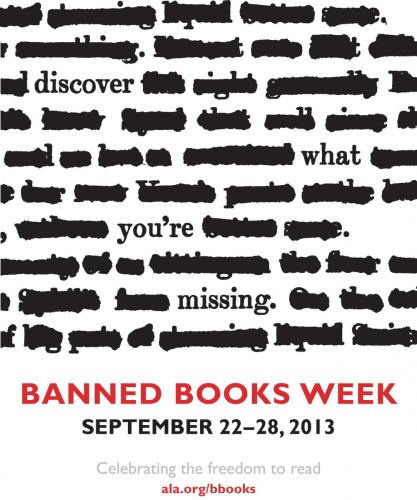Dear friends,
From Sept. 22-28, the American Library Association will sponsor Banned Books Week, an annual event that celebrates the freedom to read and highlights the value of free and open access to information.
While I wholeheartedly approve of the ALA’s efforts, I’m also saddened by the fact that this freedom isn’t already revered by the masses. After all, freedom of speech and expression is guaranteed to everyone in the U.S. by the First Amendment:
“Congress shall make no law respecting an establishment of religion, or prohibiting the free exercise thereof; or abridging the freedom of speech, or of the press; or the right of the people peaceably to assemble, and to petition the Government for a redress of grievances.”
 The reason why the First Amendment is so brilliant, so revolutionary, is that it gives artists and authors, actors and musicians, scientists and scholars the freedom to create and enlighten. The First Amendment also gives the public the right to appreciate or scorn. But the window of opportunity between these two forces closes when some person or group takes it upon themselves to censor a controversial work or idea. These folks are under the misguided notion that if they don’t like something, no one should, and they’re not about to let the freedoms guaranteed by the First Amendment get in their way.
The reason why the First Amendment is so brilliant, so revolutionary, is that it gives artists and authors, actors and musicians, scientists and scholars the freedom to create and enlighten. The First Amendment also gives the public the right to appreciate or scorn. But the window of opportunity between these two forces closes when some person or group takes it upon themselves to censor a controversial work or idea. These folks are under the misguided notion that if they don’t like something, no one should, and they’re not about to let the freedoms guaranteed by the First Amendment get in their way.
Such behavior should not be tolerated in America. Certainly not in the 21st century. As George Bernard Shaw once said, “The first condition of progress is the removal of censorship.”
So come, friends. Let us progress.
If you have children, feed their curiosity. Show them the world — the good and the bad — yet let their imaginations run wild too.
Keep up with current events, then take the time to discuss the news with people who have a wide range of opinions and experiences.
Visit an art or history or science museum and fill your eyes with wonder. Bring a friend or two and see how the sights and sounds affect them.
Change the channel on your television or radio, and experience something new. Watch a show by a new playwright or attend a concert by a band that hasn’t yet had its big break. You’ll expand your horizons and help an up-and-comer gain an audience.
Go to your favorite bookstore or local library and embark on a treasure hunt. It’s really quite simple, just wander the shelves, high and low, then pull out a book or two at random. Who knows? You may discover something new or find a favorite author.
Battle censorship head-on. If you learn about a challenge at your local school or public library, lend your voice in support of free and open access. Write letters to the editor, your public library director and your local school principal. And read materials that are banned or give them away as gifts.
According to the Newsletter on Intellectual Freedom, the most challenged/banned books of 2012 and 2013 are:
* The Absolutely True Diary of a Part-Time Indian by Sherman Alexie
* Feed by M.T. Anderson
* The Handmaid’s Tale by Margaret Atwood
* Stone Dreams by Akram Aylisli
* Uncle Bobby’s Wedding by Sarah S. Brannen
* Ender’s Game by Orson Scott Card
* The Perks of Being a Wallflower by Stephen Chbosky
* When It Happens by Susane Colasanti
* The Most Dangerous Game by Richard Connell
* Carter Finally Gets It by Brent Crawford
* Nickel and Dimed by Barbara Ehrenreich
* Like Water for Chocolate by Laura Esquivel
* Looking for Alaska by John Green
* Tintin in the Congo by Herge
* The Kite Runner by Khaled Hosseini
* Totally Joe by James Howe
* The Popularity Papers by Amy Ignatow
* Fifty Shades of Grey by E.L. James
* Different Seasons by Stephen King
* SideScrollers by Matthew Loux
* Allah, Liberty, And Love by Irshad Manji
* 500 Years of Chicago History in Pictures by Elizabeth Martinez
* Neonomicon by Alan Moore
* Beloved by Toni Morrison
* Fallen Angels by Walter Dean Myers
* Intensely Alice by Phyllis Reynolds Naylor
* Muslim Women and the Challenges of Islamic Extremism by Norai Othman
* Fight Club by Chuck Palaniuk
* The Family Book by Todd Parr
* A Child Called It by Dave Pelzer
* The Body of Christopher Creed by Carol Plum-Ucci
* In Our Mothers’ House by Patricia Polacco
* And Tango Makes Three by Justin Richardson and Peter Parnell
* Persepolis by Marjane Satrapi
* Romeo and Juliet by William Shakespeare
* Prep by Curtis Sittenfeld
* A Thousand Acres by Jane Smiley
* Waterland by Graham Swift
* Hero-Heel 2 by Makoto Tateno
* The Dirty Cowboy by Amy Timberlake
* Stuck in Neutral by Terry Trueman
* The Glass Castle by Jeannette Walls
* Robopocalypse by David Howard Wilson
* The Electric Kool-Aid Acid Test by Tom Wolfe
You may love these stories. Or you may find them offensive. So why defend banned books or other censored material??
Sincerely,
Jade
P.S. If you know the author of the quotation above the valediction, click here and email the name, along with your snail mail address. Do that and I will send you one of the books on the banned books list. This offer is available to the first 25 people who send me the correct answer by Sept. 28.)

